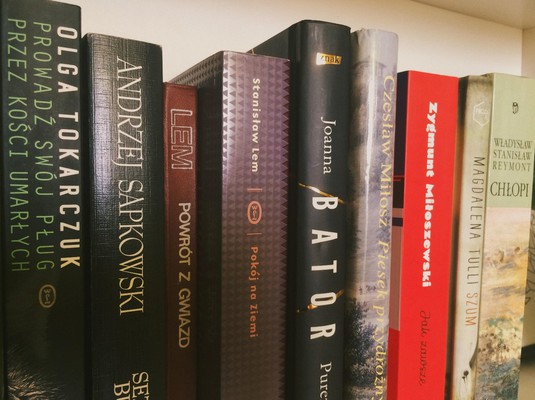Sind literarische Werke eine Visitenkarte der Nation?/ Are literary works the nation’s flagship?
Bożena Cudak - 30.09.2018 @ 18:20
Are literary works the nation's flagship? You can find the asnwer to this question in this article. I hope you will enjoy reading it :)
Are literary works the nation’s flagship?
by Julia Pawlak, VIII LO Kraków/Poland
Polish literature isn’t considered to be very popular abroad. It is thought to be difficult, clannish, exotic even. After the sudden boom in the 80’s, Polish literature has been getting less and less popular, and these days, a major players on the market of non-English literature are Scandinavian authors. But there are still some Polish authors who remain succesful. But what can we say about Poland from their book? Are their books a flagship of our country?
An answer to this question can vary depending on which of the publishing markets we might look at. There are some Polish authors that are quite unique; they are very popular in one country, but not that much in another. The example here would be probably Janusz Leon Wiśniewski, whose books are very popular in Russia, to the point where some of his books are actually getting published there earlier than in Poland. But with a few other cases like that, the most popular authors overall, would be Tokarczuk, Lem, Kapuściński and Sapkowki, not to mention a few more. Actually, Sapkowki could be considered the brightest star of Polish literature abroad, at least when it comes to the mass culture. His books are said to be bestsellers both in Europe and in the US.
But how do those authors represent our country? Even though, not all of them write specifically about Poland, they still leave some cultural marks here and there. Sapkowski refers to Polish folklore and legends several times in his books and Tokarczuk’s one of the most popular books ,,Primeval and Other Times” is set in the village in the middle of Poland. Even Kapuściński, who, after all, writes about other countries, does that from a very particular and unique perspective of someone who spend their youth in the occupied Poland.
Even though not all of the authors write about their countries, often the way they were raised, they cultural references and beliefs remain unique for their homeland. The only hope here, is that they can become succesful in other places, and be a good representation and a good flagship of their country.
 Photo by Julia Pawlak
Photo by Julia Pawlak
Julia Pawlak - 14.11.2018 @ 17:31
Den Artikel von Julia fand ich lesewert und deshalb habe ich ihn auf Deutsch übersetzt!
Sind literarische Werke eine Visitenkarte der Nation?
von Julia Pawlak, VIII LO Kraków/Polen
Im Ausland findet man polnische Literatur schwierig, unnahbar, geradezu exotisch. Nach dem plötzlichen Boom in achtziger Jahren, ist polnische Literatur weniger populär geworden und heute ist skandinavische Literatur der Hauptspieler auf dem Buchsmarkt. Aber haben manche Schriftsteller aus Polen den Erfolg bei den ausländischen Lesern erreicht. Wie ist die Vorstellung von unserem Volk, das man in ihren Büchern sehen kann? Sind ihre Werke eine Visitenkarte von unserem Land?
Die Antwort auf diese Frage kann diametral anders sein, sie hängt davon, auf welchen Buchsmarkt wir blicken. Es gibt spezifische Schriftsteller, die sehr populär nur in einem Land und für größeres Publikum nicht bekannt sind. Zum Beispiel Janusz Leon Wiśniewski, dessen Bücher in Russland sehr populär sind – manche von seinen Werken erscheint sich zuerst in Russland und erst dann in Polen. Die bekanntesten polnischen Schriftsteller im Ausland sind: Olga Tokarczuk, Stanisław Lem, Ryszard Kapuściński oder Andrzej Sapkowski. In dieser Gegenüberstellung ist Sapkowski ein am hellsten leuchtender Stern, wenigstens wenn es um populäre Kultur geht. In Europa und auch in den USA wurden seine Bücher als Bestsellern klassifiziert.
Aber wie repräsentieren diese Schriftsteller unser Land? Obwohl sich nicht alle unmittelbar auf Thema beziehen, sind ihre Bücher weiter mit kulturellen Symbolen kennen gezeichnet. In seinen Publikationen bezieht sich Sapkowski vielmal auf polnische Folklore und Legende, und der Hintergrund eines von Olga Tokarczuks bekanntesten Romanen – „Urgeschichte und andere Zeiten“ („Prawiek i inne czasy”) – ist ein typisches polnisches Dorf. Sogar Kapuściński, der die Reportagen über andere Länder schreibt, macht das von der Perspektive und mit dem Bewusstsein jemandes, der in den kommunistischen Zeiten in Polen aufgewachsen ist.
Obwohl nicht alle Schriftteller über ihre Länder schreiben, sind ihre Ansichten und Meinungen über die Welt einzigartig für den Ort, wo sie erwachsen sind. Eine einzige Hoffnung in diesem Fall ist das, dass ihre Bücher bei ausländischen Leser das Interesse erwecken können und eine gute Visitenkarte für das Land des Schriftstellers werden.
übersetzt von Anna Malinowska